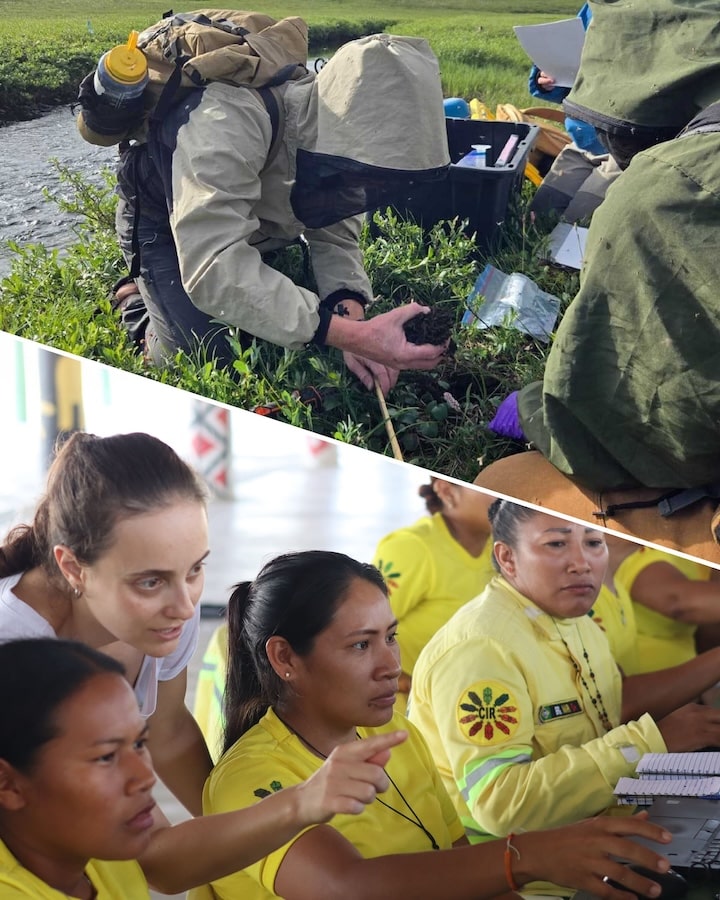To sustain the world’s growing population, we need both farms and forests. Tanguro provides a window into this critical balancing act.
Located in Mato Grosso, Brazil, Tanguro is a field research station on a working agricultural farm at the Amazonian agricultural frontier, which has experienced some of the highest rates of deforestation and fire in past decades. It is a varied landscape with over 40 thousand hectares of croplands producing soybeans, cotton, maize, and beans, and an equal area of standing native forest—making it a model for research on the complex interplay between forests, agriculture, biodiversity, and climate.
For twenty years, Tanguro has served as a research and education hub for Woodwell Climate Research Center and Instituto de Pesquisa Ambiental da Amazônia (IPAM Amazônia, Amazon Environmental Research Institute), as well as others. Research at Tanguro has generated more than 240 scientific publications in 20 years, and the field station’s facilities and staff have supported over 215 students from around the world in developing their Ph.D. dissertations or master’s theses, completing short research internships or field courses, or learning how to better communicate science to the general public.
Tanguro lies in the southern Amazon, the driest portion of the Amazon Basin, and harbors a transitional forest between Amazon forests and Cerrado/savannas. It was originally deforested and converted to cattle pasture in the mid-1980s. Conversion to croplands began in the early 2000s and was completed by 2008. Starting in 2010, it underwent a rapid shift from soybean single-cropping to soybean-corn double-cropping in a single season. In 2020 there was another rapid shift, with more than half of the farm devoted to cotton.
The topography, soils, hydrology, climate, and farming practices at Tanguro are typical of the southern and eastern Amazonian agricultural frontier. Because of those conditions, and particularly a long dry season, the agriculture and natural vegetation are very sensitive to even modest changes in fire occurrence, climate, and their interactions.
Woodwell Climate’s work at Tanguro Research Station is supported by the National Science Foundation, the National Aeronautics and Space Administration, Bayer, Max Planck Institute, São Paulo Research Foundation, Yale University, and Woodwell Climate’s Fund for Climate Solutions.
To address the climate crisis, we must take urgent action to reduce anthropogenic emissions while simultaneously removing carbon dioxide from the atmosphere.
Land management has the potential to do both, but to realize this potential we must understand how much storage space is available, where that space is located, and what actions can be taken in those places to capitalize on these natural climate solutions as soon as possible.
The latest report from the Intergovernmental Panel on Climate Change (IPCC)’s Working Group III highlights the significant mitigation potential of natural and managed ecosystems given the opportunity they offer to remove additional carbon from the atmosphere. Many countries are expected to count heavily on natural climate solutions when designing strategies for delivering on their commitments to climate change mitigation under the Paris Agreement.
Our Work
- We produced a first-of-its-kind globally consistent spatial dataset (~500m resolution) of current, potential, and unrealized potential carbon storage in forest and and other woody ecosystems and their associated soils.
- We also created a framework for prioritizing on-the-ground actions related to the restoration, improved management, and maintenance of carbon stocks in these systems.
Impact
Data produced as part of this project should prove valuable for national and jurisdictional prioritization of actions and locations to increase land-based carbon storage and realize meaningful near-term climate benefits.




